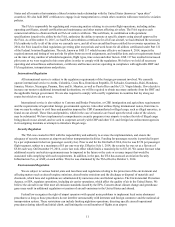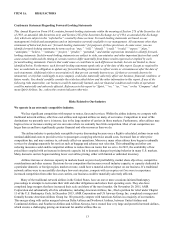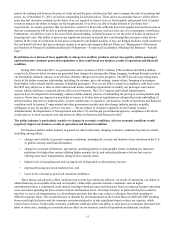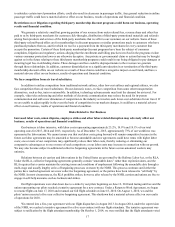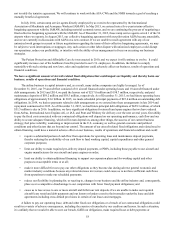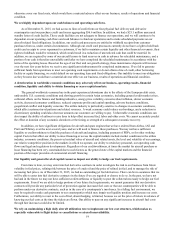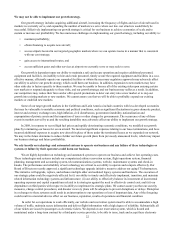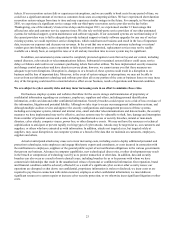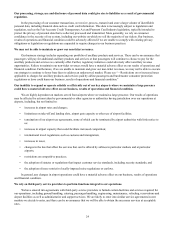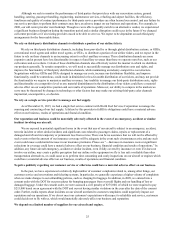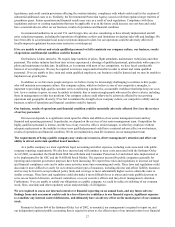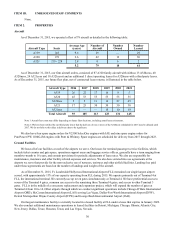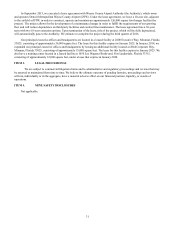Spirit Airlines 2015 Annual Report Download - page 21
Download and view the complete annual report
Please find page 21 of the 2015 Spirit Airlines annual report below. You can navigate through the pages in the report by either clicking on the pages listed below, or by using the keyword search tool below to find specific information within the annual report.21
long onboard tarmac delays, as well as additional reporting requirements for airlines that could increase the cost of airline
operations or reduce revenues. The DOT has been aggressively investigating alleged violations of these rules. A second set of
DOT final rules, which became effective in August 2011 and January 2012, addresses, among other things, concerns about how
airlines handle interactions with passengers through advertising, the reservations process, at the airport and on board the
aircraft, including requirements for disclosure of base fares plus a set of regulatorily dictated options and limits on cancellations
and service charges for changes and cancellations. Additional consumer passenger rules were proposed in 2014 which may be
implemented in 2016 and additional disability rules may be proposed in 2016. In addition, during 2014, the FAA issued its final
regulations governing pilot rest periods and work hours for all airlines certificated under Part 121 of the Federal Aviation
Regulations. The rule known as FAR 117, which became effective January 4, 2014, impacts the required amount and timing of
rest periods for pilots between work assignments and modifies duty and rest requirements based on the time of day, number of
scheduled segments, flight types, time zones and other factors. Compliance with these rules may increase our costs, while
failure to remain in full compliance with these rules may subject us to fines or other enforcement action.
In August 2010, the Airline Baggage Transparency and Accountability Act was introduced in the United States Senate.
This legislation, as proposed, would have increase disclosure regarding fees for airline ticket sales, impose federal taxes on
charges for carry-on and checked baggage, authorize the DOT's Aviation Consumer Protection Division to oversee lost and
stolen baggage claims, and require data collection and the public release of collected data concerning airline handling of lost,
damaged and stolen luggage. In early 2011, the United States Senate passed an amendment to the FAA reauthorization bill that,
if enacted, would have imposed federal taxes at a rate of 7.5% on charges for carry-on baggage. Currently, there have been no
updates regarding such legislation. However, in the event the Airline Baggage Transparency and Accountability Act, the Senate
amendment to the FAA reauthorization bill or similar legislation were to be enacted, it is uncertain what effect it would have on
our results of operations and financial condition.
We cannot assure you that these and other laws or regulations enacted in the future will not harm our business. In
addition, the TSA mandates the federalization of certain airport security procedures and imposes additional security
requirements on airports and airlines, most of which are funded by a per ticket tax on passengers and a tax on airlines. Prior to
and for the first half of 2014, the passenger security fee was $2.50 per passenger flight segment, subject to a $5 per one-way
trip cap. In July 2014, the TSA implemented an increased passenger security fee at a flat rate of $5.60. On December 19, 2014,
a new law took effect which limits a round-trip fee to $11.20. We cannot forecast what additional security and safety
requirements may be imposed in the future or the costs or revenue impact that would be associated with complying with such
requirements.
Our ability to operate as an airline is dependent on our maintaining certifications issued to us by the DOT and the
FAA. The FAA has the authority to issue mandatory orders relating to, among other things, the grounding of aircraft, inspection
of aircraft, installation of new safety-related items and removal and replacement of aircraft parts that have failed or may fail in
the future. A decision by the FAA to ground, or require time consuming inspections of or maintenance on, our aircraft, for any
reason, could negatively affect our business and financial results. Federal law requires that air carriers operating large aircraft
be continuously “fit, willing and able” to provide the services for which they are licensed. Our “fitness” is monitored by the
DOT, which considers factors such as unfair or deceptive competition, advertising, baggage liability and disabled passenger
transportation. While the DOT has seldom revoked a carrier's certification for lack of fitness, such an occurrence would render
it impossible for us to continue operating as an airline. The DOT may also institute investigations or administrative proceedings
against airlines for violations of regulations.
The U.S. government is under persistent pressure to implement cost cutting and efficiency initiatives. In addition, the
U.S. government has recently and may in the future experience delays in the completion of its budget process which could
delay funding for government departments and agencies that regulate or otherwise are tied to the aviation industry, including
the DOT and FAA. To the extent that any such initiatives or budgeting delays affect the operations of these government
departments and agencies, including by forcing mandatory furloughs of government employees, our operations and results of
operations could be materially adversely effected.
International routes are regulated by treaties and related agreements between the United States and foreign
governments. Our ability to operate international routes is subject to change because the applicable arrangements between the
United States and foreign governments may be amended from time to time. Our access to new international markets may be
limited by our ability to obtain the necessary certificates to fly the international routes. In addition, our operations in foreign
countries are subject to regulation by foreign governments and our business may be affected by changes in law and future
actions taken by such governments, including granting or withdrawal of government approvals and restrictions on competitive
practices. We are subject to numerous foreign regulations based on the large number of countries outside the United States
where we currently provide service. If we are not able to comply with this complex regulatory regime, our business could be
significantly harmed. Please see “Business — Government Regulation.”


